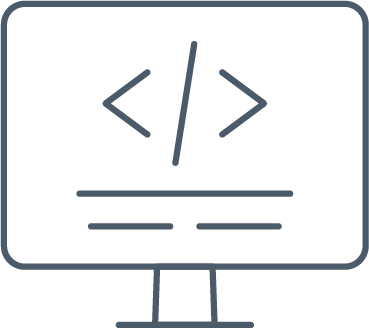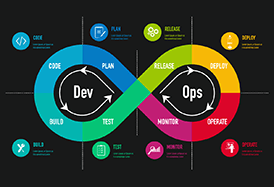![]()
DevOps services can minimize your costs, increase efficiencies and speed up the product release cycle. With an “everything as code” mindset, it’s easy to deploy code updates quickly so that new features and bug fixes reach your customers sooner with far less risk. Cardinal Peak’s DevOps solutions automate the entire process pipeline, including builds, test cases, quality checks, security and more.
A DevOps mindset sees the entire process through launching updated software to be the responsibility of the development team, so that both development and operations are one team. Owning the entire process encourages our team to automate every step and manage infrastructure and system settings like the code is managed. In the past, IT operations were not tightly integrated into the development team, leading to delays and opportunities for miscommunication. In DevOps, we see continuous development, continuous integration, continuous testing and continuous deployment as one “continuous” process.
Our DevOps Consulting Services
 Infrastructure as Code
Infrastructure as Code
We provision and manage infrastructure using code and software development techniques, such as version control and continuous integration. Utilizing the cloud’s API-driven model enables our developers and system administrators to interact with infrastructure programmatically — and at scale — instead of manually setting it up and configuring resources. The DevOps-as-a-service approach empowers our engineers to interface with infrastructure using code-based tools and treat the infrastructure similarly to application code. Defined by code, infrastructure and servers can quickly be deployed using standardized patterns, updated with the latest patches and versions, or duplicated in repeatable ways.
 Configuration Management
Configuration Management
Our developers use code to automate operating system and host configuration, operational tasks and more. The use of code makes configuration changes repeatable and standardized. It frees developers and admins from manually configuring operating systems, system applications or server software. Since manual operations can be fraught with error and are difficult to monitor, managing configuration as code dramatically reduces the risk of errors.
 Security and other Policy as Code
Security and other Policy as Code
With infrastructure and its configuration set up as code in the cloud, we can monitor and enforce compliance at scale. Since infrastructure that is described by code can be tracked, validated and reconfigured in an automated way, it’s easier to ensure security measures are properly enforced system-wide (e.g. information security or compliance with PCI-DSS or HIPAA). This allows us to move at higher velocity since non-compliant items can be automatically flagged for investigation.
 Monitoring and Logging
Monitoring and Logging
We set up monitoring of metrics and logs to see how the application and infrastructure performance impacts the experience of end users. We automate the capture, categorization and analysis of data and logs generated by applications and infrastructure to understand how changes impact users. This helps us find the root causes of problems quickly. Creating alerts and performing real-time analysis of logs helps us proactively monitor your services.
Learn about our CloudOps services for managing and optimizing the software operations for our product.
DevOps Services Case Studies
Our DevOps consulting increases efficiency and streamlines delivery. Check out these case studies.

Video-On-Demand Implementation with Infrastructure as Code & DevOps

Preparing Legacy Software for Future Platform Growth

HIPAA-Compliant Video Management System and App Development
With cloud services deployed on AWS and a custom app, we developed a HIPAA-compliant video care system to revolutionize patient engagement, communication and outcomes. Medical Memory helps patients and caregivers understand their health status and treatment plans.
With cloud services deployed on AWS and a custom app, we developed a HIPAA-compliant video care system to revolutionize patient engagement, communication and outcomes. Medical Memory helps patients and caregivers understand their health status and treatment plans.
DevOps Solutions FAQs
What is DevOps?
Combining “development” and “operations,” DevOps is a set of practices to automate and integrate processes between development and operations teams. It facilitates faster and more reliable software development, testing and release. In the past, development and infrastructure teams functioned separately. DevOps removes those barriers, automates and streamlines processes and the result is increased quality and value.
What is the Main Goal of DevOps?
The primary goal of DevOps is improving collaboration across the value stream to ensure a more streamlined development process and ultimately speed up the time to market. By automating traditionally manual and slow dev processes to achieve that goal, organizations can solve problems faster and more reliably, minimize costs, significantly improve product quality, better serve customers and move ahead in the competitive market.
What are the Primary Benefits of DevOps?
DevOps delivers a wealth of business and technical benefits that can result in delighted customers.
- Rapid Problem-Solving and Innovation
- Quick Product Delivery
- Improved Scalability, Availability and Visibility
- Better Stability
- Automation of Repetitive Tasks
- Continuous Development, Integration and Deployment
- Cross-Team Collaboration
- Resource Savings
- Stronger Security
The DevOps model encourages communication and teams to work together to share responsibilities, better utilize resources and combine workflows to reduce inefficiencies and save time. Increasing the frequency of releases drives innovation so that you can release new features and fix bugs to improve your product more quickly. Automation allows for improved management of complex or changing systems efficiently and with reduced risk while retaining control and preserving compliance. Moving quickly enables you to innovate for customers faster, adapt to the evolving markets better and scale more efficiently. You can reliably deliver faster while maintaining the best UX possible by ensuring the quality of application updates and infrastructure changes with our DevOps services.
DevOps Consulting Related Articles
Interested in learning more about our DevOps consulting services? These blogs offer our team’s insight.

How IoT Engineering Delivers Business Value
Organizations across industries are leveraging IoT solutions and cloud connectivity to realize the substantial value such solutions deliver to move businesses forward.

Cost Drivers Impacting Queue Pricing
From durability to throughput and fan-out, discover the cost drivers that most significantly impact queue pricing. Learn key queuing service cost drivers, including how each element ultimately impacts your bottom line.

The Advantages of DevOps and Overcoming DevOps Challenges
Organizations across industries are leveraging IoT solutions and cloud connectivity to realize the substantial value such solutions deliver to move businesses forward.
From durability to throughput and fan-out, discover the cost drivers that most significantly impact queue pricing. Learn key queuing service cost drivers, including how each element ultimately impacts your bottom line.
